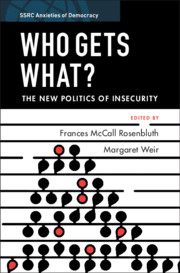Book contents
- Who Gets What?
- SSRC Anxieties of Democracy
- Sponsored by the Social Science Research Council
- Who Gets What?
- Copyright page
- Contents
- Figures
- Tables
- Author Biographies
- Acknowledgments
- 1 Introduction
- Part I People
- Part II Places
- Part III Politics
- 9 Electoral Realignments in the Atlantic World
- 10 Political Parties in the New Politics of Insecurity
- 11 The Peculiar Politics of American Insecurity
- 12 The Anxiety of Precarity
- 13 Increasing Instability and Uncertainty among American Workers
- Index
- References
9 - Electoral Realignments in the Atlantic World
from Part III - Politics
Published online by Cambridge University Press: 20 August 2021
- Who Gets What?
- SSRC Anxieties of Democracy
- Sponsored by the Social Science Research Council
- Who Gets What?
- Copyright page
- Contents
- Figures
- Tables
- Author Biographies
- Acknowledgments
- 1 Introduction
- Part I People
- Part II Places
- Part III Politics
- 9 Electoral Realignments in the Atlantic World
- 10 Political Parties in the New Politics of Insecurity
- 11 The Peculiar Politics of American Insecurity
- 12 The Anxiety of Precarity
- 13 Increasing Instability and Uncertainty among American Workers
- Index
- References
Summary
The consensual, moderate politics that characterized the golden age of democratic capitalism hasgiven way, in the past decades, to growing public dissatisfaction toward political elites,ideological polarization, and the rise of populist parties. This chapter starts by exploring theeconomic foundations of that remarkable political turnaround. It then describes the historicalsequence through which populist movements took advantage of those changes. And it concludesby discussing potential responses to the new economic and political challenges faced byadvanced economies.
- Type
- Chapter
- Information
- Who Gets What?The New Politics of Insecurity, pp. 213 - 236Publisher: Cambridge University PressPrint publication year: 2021

